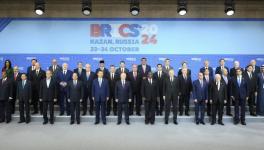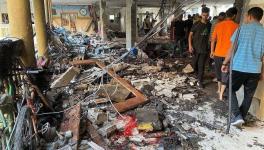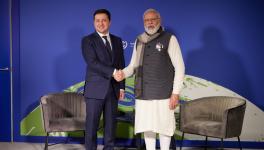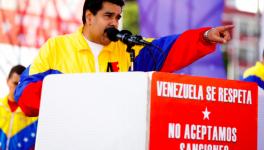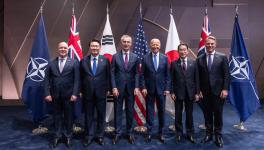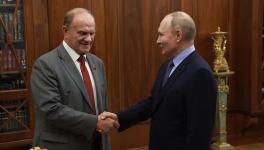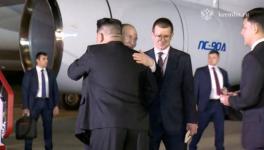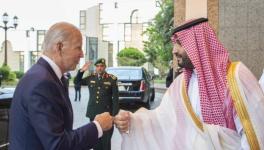In Hour-Long TV Speech, Putin Announces Russia’s Recognition of Ukraine-Held Rebel Areas
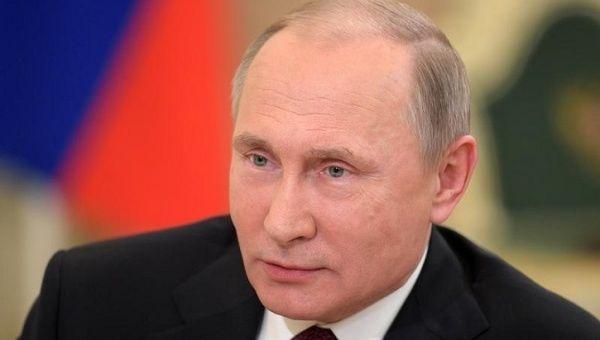
Moscow: Russia announced on Tuesday that its recognition of independence for areas in eastern Ukraine extends to territory currently held by Ukrainian forces —raising Western fears of a full-fledged ‘invasion’ of Ukraine.
Kremlin spokesman Dmitry Peskov said that Russia has recognised the rebel regions' independence “in borders that existed when they proclaimed” their independence in 2014.
Ukrainian forces later reclaimed control of large part of both regions during a nearly eight-year conflict that has killed over 14,000 people.
The announcement comes a day after Russia said it would recognise the independence — but didn't say exactly what it considered the borders of those areas to be. The move was widely seen in the West to presage a Russian ‘invasion’. Russia has reportedly amassed an estimated 150,000 troops near Ukraine in recent weeks.
Western leaders have denounced the move and said they are preparing to announce sanctions.
Russian officials haven't yet acknowledged any troop deployments to the rebel east, but Vladislav Brig, a member of the separatist local council in Donetsk, told reporters that the Russian troops already “had moved in”.
Ever since the conflict erupted weeks after Russia's 2014 annexation of the Ukrainian Crimean Peninsula, Ukraine and its Western allies have accused Moscow of backing the separatists with troops and weapons, the charges it has denied, saying that Russians who fought in the east were volunteers.
Putin's move Monday formalises Russia's hold on the regions and gives it a free hand to deploy its forces there.
And Russia set the stage for a quick move to secure its hold on the regions on Tuesday with new legislation that would allow the deployment of troops there. The Bills, which are set quickly sail through both houses of Russian parliament, envisage military ties, including possible deployment of Russian military bases in the rebel regions.
Ukraine's President Volodymyr Zelenskyy sought to project calm, telling the country in an address overnight: “We are not afraid of anyone or anything. We don't owe anyone anything. And we won't give anything to anyone.” His foreign minister, Dmytro Kuleba, would be in Washington on Tuesday to meet with Secretary of State Antony Blinken, the State Department said.
The White House responded quickly, issuing an executive order to prohibit US investment and trade in the separatist regions, and additional measures — likely sanctions — were to be announced on Tuesday.
Other Western allies also said they were planning to announce sanctions.
British Prime Minister Boris Johnson said Tuesday the UK will also introduce “immediate” economic sanctions against Russia, and warned that Putin is bent on “a full-scale invasion of Ukraine ... that would be absolutely catastrophic."
While Ukraine and the West said the Russian recognition of the rebel regions shatters a 2015 peace deal, Russia's ambassador to the United Nations, Vassily Nebenzia, challenged that, noting that Moscow isn't a party to the Minsk agreement and arguing that it could still be implemented if Ukraine chooses so.
The 2015 deal that was brokered by France and Germany and signed in Minsk, the Belarusian capital, required Ukraine to offer a sweeping self-rule to the rebel regions in a diplomatic coup for Russia after a series of Ukrainian military defeats. Many in Ukraine resented the deal as a betrayal of national interests and a blow to the country's integrity, and its implementation has stalled.
Putin announced the move in an hour-long televised speech, blaming the US and its allies for the current crisis and describing Ukraine's bid to join NATO as an existential challenge to Russia.
“Ukraine's membership in NATO poses a direct threat to Russia's security,” he said.
Russia says it wants Western guarantees that NATO won't allow Ukraine and other former Soviet countries to join as members — and Putin said Monday that a simple moratorium on Ukraine's accession wouldn't be enough. Moscow has also demanded the alliance halt weapons deployments to Ukraine and roll back its forces from Eastern Europe — demands flatly rejected by the West.
Putin warned Monday that the Western rejection of Moscow's demands gives Russia the right to take other steps to protect its security.
Sweeping through more than a century of history, Putin painted today's Ukraine as a modern construct used by the West to contain Russia despite the neighbours inextricable links.
In a stark warning to Ukraine, the Russian leader charged that it has unfairly inherited Russia's historic land granted to it by the communist rulers of the Soviet Union and mocked its effort to shed the communist past in a so-called “decommunisation” campaign.
“We are ready to show you what the real decommunisation would mean for Ukraine,” Putin added in an apparent signal of his readiness to raise new land claims.
Get the latest reports & analysis with people's perspective on Protests, movements & deep analytical videos, discussions of the current affairs in your Telegram app. Subscribe to NewsClick's Telegram channel & get Real-Time updates on stories, as they get published on our website.










